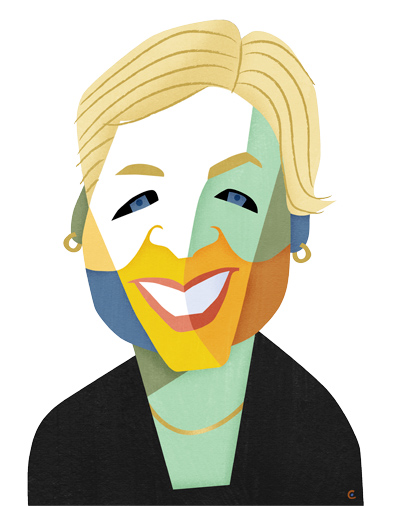Master Class
I have two degrees in education, and in my entire career, I have brought that focus into all the work I do. And my work has always been about bringing classical music into people’s lives, in one way or another. The educational aspect has been looking at the question from the listener’s point of view.
My career in the arts started when I was pursuing my master’s degree in English education at the Warner School. I worked at Eastman, typing for the humanities and composition departments for a year or so, and I fell into a job in the concert office. It was like a giant lightbulb went off. I thought, “You mean that I can organize and promote musicians?” All my life I thought if you were in music, you either taught music or were a performer. I loved teaching. I had taught elementary music, but thought maybe I’d prefer teaching kids English. I didn’t know there were these other options in the arts.
 (Illustration: David Cowles for Rochester Review)
(Illustration: David Cowles for Rochester Review)I think the power of classical music is timeless. Some people have said classical music is music that rewards the patient listener, that gets deeper, over time, with every listening. A station manager at Discover Classical in Dayton, Ohio, put it this way: “When you seem to be at a complete loss for words, this music can pick up right where you leave off.” It’s the power and the emotion of the music. I feel like I’m a deeper person because of classical music.
Classical music is hard to define in any precise way. There’s 500 years and growing of repertoire. The instrumentation and the orientations toward composition can change. I’ve sat through conferences for years listening to programmers debate whether film music is classical music, and if so, which film music, and so forth.
Every market is different. The station manager in Austin, Texas, said, “You know, Austin is kind of a quirky town. Our classical station probably isn’t a cookie cutter for other stations across the country. We might be doing things differently, but it works in our community.” The overall objective of our project is to say, how can classical radio be strong and thriving in each local market? How can it be a hub of the local arts community? And are there things we can do and explore together that will make everybody stronger in their individual choices for what they’re doing?
Wende Persons ’79W (MS)
Home: New York City
Managing director of Classical Music Rising, a collaborative project of classical music radio stations nationwide to shape the future of classical radio; instructor of marketing the performing arts at NYU’s Steinhardt School of Culture, Education, and Human Development. Previous roles: senior consultant, 21C Media Group, with clients including Lincoln Center, New York Foundation for the Arts, and ArkivMusic.
First gig in arts management: Orchestra manager for the Eastman Philharmonia at the Heidelberg Castle Festival in Germany.
I came into Classical Music Rising thinking that the major focus was going to be on technology shift. What I was surprised to see, however, is that broadcast radio is still the bread and butter for every station in this project. A few years ago, the Knight Foundation did a classical music consumer segmentation study, and they found that radio is the portal. It’s the dominant avenue of public access to classical music in the United States. So we have a dual focus of figuring out how we can make sure we’re maximizing what we do right now, as well as moving forward and extending our brand onto other platforms.
We’ve been talking a lot about marketing. I’ve been asking people at stations across the country: what do you do to let people know you’re there? I talked to the station manager at All Classical Portland in Oregon, and he said, “We can’t afford billboards, but we did buy a vintage 1954 Chevy, and we drive it all over town. It’s got great speakers, it’s got our call letters on the side, and the 20-somethings love to take selfies of it.”
I do think classical music suffers from an image problem. We aren’t talking about an old, musty format, but a format that’s vibrant and moves people of all ages. KUSC in Los Angeles, in the first quarter of this year, had more listeners than any public radio station in the country. And that’s with a 24-hour classical format. Public radio news and information is a force in our culture, and in many markets, so is classical radio. It’s much more vibrant than many people realize.

